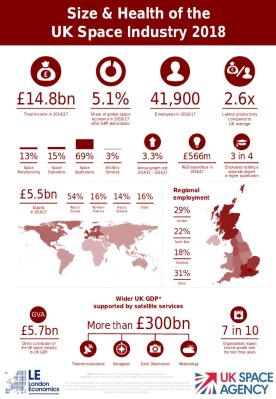
In a completely unexpected move, the British Prime Minister Theresa May yesterday announced outside Number 10 Downing Street that the UK would resume its space launch programme, 47 years after its cancellation following the launch of the Prospero satellite. She outlined a bold plan with a target of placing the Doc Martens of a British astronaut on the Lunar surface as early as 2024. Funded by the £350m per week Brexit windfall, the move would she said place the country at the forefront of a new 21st century Space Race with the North Koreans.
An estimated 2 million jubilant supporters took to the streets of London at the news, bringing the capital to a halt as they paraded with colourful banners from Hyde Park to Trafalgar Square and down Whitehall past her Downing Street home. Meanwhile the value of shares in the popular British high street bakery firm Patisserie Gregoire jumped by 19% as it was revealed that their new vegan sausage roll had in fact been a secret trial of the British astronaut diet.
Wait… There Really Is A British Space Effort?

As you might imagine, here at Hackaday we are enthusiastic about space exploration, and welcome wholeheartedly any news of new initiatives in that direction. But we recognise that in the light of the fast-moving political theatre of Brexit these are turbulent times in which what makes the headlines on April 1st might well have become merely chip wrappers by April 2nd. So to try to make sense of the story and give it some context, we thought we’d take a moment to look at the British space industry as it stands. And with a 5.1% share of the global space economy, a Government-funded UK Space Agency with plans for a spaceport, a host of space related work from the private sector, and some of the world’s more bleeding-edge research, it might come as a surprise to find out just how much of it there is.
It’s difficult to write any story involving the UK in early 2019 though without further mention of Brexit, and the space business is certainly no exception with industry figures expressing concern about its effect. A story that came and went last year was that UK firms would be excluded from contracts associated with the Galileo satellite navigation system. Since a significant proportion of Galileo used British technology and their control centre was in the UK, the Government responded by announcing that it would commission a study into creating their own constellation of navigation satellites. To this end they have committed £92m, a sum which seemed to go down well with the choir but even with the UK’s demonstrable expertise in the field would represent a drop in the ocean compared to the cost of a final system. In a nutshell: they could certainly do it, but at a cost which future Governments might find difficult to stomach. This is something which if you’ve read the Prospero piece linked above, you’ll know has happened before. If there is a glimmer of hope for Brits in all this it is that the UK is still part of the European Space Agency, but as with Galileo any UK access might be limited when it comes to ESA projects funded by the EU.
One Day Maybe All Space Planes Will Have British Engines
![A model of an earlier SABRE engine design. Science Museum London / Science and Society Picture Library [CC BY-SA 2.0]](https://hackaday.com/wp-content/uploads/2019/03/sabre_engine_designed_for_skylon_spaceplane_1990s._9660572897.jpg?w=400)
HOTOL was a 1980s programme to create a horizontal-takeoff British Aerospace spaceplane that was cancelled as the government of the time decided its focus should lie with the conventional rockets of ESA. Three HOTOL engineers formed Reaction Engines in 1989 with the aim of developing the HOTOL concept of a hybrid engine and aircraft that could use atmospheric oxygen to burn during the stages of its flight close to Earth, only switching to its onboard oxygen tanks as atmospheric pressure reduced to the point of not supporting combustion and the craft entered space. Their work has culminated in the precooled SABRE engine of which they are expected to have a ground-based working prototype by 2020, and the Skylon spaceplane concept design which will it is hoped fly in a future decade. In another nod to the Prospero story, the company’s UK test facilities are at Westcott in Buckinghamshire, once home to test stands for the cancelled Blue Streak rockets of the 1950s.
So you may by now have gathered that while those British boots might not be treading the surface of the Moon in five years time to wave at their American and perhaps Chinese rivals there is a surprising amount of British space tech already in the skies as well as the promise of more to come. Whoever next lands a craft on the Moon should be hailed by space enthusiasts of all nations, accompanied by the fervent hope that they do so in safety and return home unscathed. Brits meanwhile should have no need to go back to the moon for a few more decades, after all they sent an intrepid pair of explorers there in the 1980s.
Header image: Prime Minister, Kuhlmann [CC BY 3.0]/Number 10 Downing St, Sergeant Tom Robinson RLC/MOD [OGL v1.0]
















They could build a rocket, but I doubt that they would be able to decide if they should launch it and where it should fly.
Planexit?
Had me until the £350 million bit, was genuinely excited until I saw that.
Plexit ;)
Send it up and retrieve their investment in navigation.
Mort Sahl said it best, in relation to von Braun
“I aim at the stars, but sometimes I hit London”
Only time will tell if Britain’s german rocket scientists as good as everyone else’s German rocket scientists…
Somewhere I read that when Isaac Asimov was introduced to Werner von Bruan, Isaac Asimov refused to shake von Brauns hand.
I hope it’s true
Sorry to disappoint you but from Asimov’s autobiography “In Joy Still Felt 1954-1978” page 323 “The moderator, anxious to introduce everyone to everyone, brought von Braun to me … there were eight hundred people in the audience watching … I couldn’t make a scene; he was holding out his hand. I had to take it and hold it as weakly and as briefly as possible – but I did shake hands. Ever since then, I have had the queasy feeling that I have shaken a hand that shook the hand of Adolf Hitler.”
No reason to be too concerned. I bet we’ve all got a few Adolf Hitler atoms floating around in side each of us. Stuff gets around you know. :-)
Six Degrees of Separation
https://en.wikipedia.org/wiki/Six_degrees_of_separation
GREGG Toland
https://en.wikipedia.org/wiki/Gregg_Toland
James Wong Howe
https://en.wikipedia.org/wiki/James_Wong_Howe
Robert Burks
https://en.wikipedia.org/wiki/Robert_Burks
And what was Von Braun supposed to do Edward? He started taking money from the Nazi government when he was in his early twenties because he wanted to go to the moon and Mars. Was he supposed to see into the future and know what was coming? Once you take money from the Nazi’s you can’t say you changed your mind and don’t want to work for them anymore. Should he have killed him self? What’s more, had Hitler taken the money from the V1 and V2 programs (both of which were failures) and put it into German jet-fighter technology or six engine trans-Atlantic bombers the war may have turned out very different to say nothing of the sky line of New York. Von Braun’s work was a fantastic way for Hitler to waste valuable resources in something Von Braun correctly saw as having peaceful post-war applications.
If you’re going to condemn the man himself for what his government forced him to do then you must do the same for all the men who followed orders to bomb German Civilians which had absolutely no impact on ending the war. Should they all have done what was best for the future? Yeah probably, but who among us would actually kill our selves vs follow orders that might allow us to live to see our families again?
von Braun could have run away. But he didn’t. He chose to collaborate with the nazi regime. When the War ended he was picked up by the US as a engineering asset – his image rehabilitated for popular consumption. The Soviets had their own nazi rocket scientists.
Considering how the nazi regime treated the civilians of its enemies, it was only fitting that the Brits, the US and SU beat the crap out of nazi Germany. Demoralize all parts of nazi Germany was an effective tactic.
In WW2, the ends DID justify the means.
(This is getting very off-topic, so I will attempt to be brief)
You can reasonably argue that the V1 / V2 were a reasonable extension of bombing of civilian targets, It is harder to argue in favour of building the rockets with slave labour from Mittelbau-Dora.
Deliberately attacking non-military civilian targets is something that Germany pioneered in WW1, with the naval artillery bombardment of Hartlepool, Scarbough and Whitby ( https://en.wikipedia.org/wiki/Raid_on_Scarborough,_Hartlepool_and_Whitby )
But this was all a long time ago, and (almost) nobody alive today played any part in any of it.
Fool me once, shame on you. Fool me twice, shame on me. Fool me on April 1st and I’m an idiot.
April Fools!
Thank you, April The First, for this wonderful news…
Wow, one well written April Fools joke….
Even the mass-media is in on this joke. XD
And Theresa May seems in on the joke too.
It would be a nice dream to come true for Britain to have our own space programme…
As i said in the serious part of the article, we kinda do. But not a manned one.
Though the SABRE engine is no joke and could actually make carbon neutral air travel something a senator from Utah can’t make jokes about as it would actually be better than existing airliners vs worse.
April Fools!
Hopes Brexit was just some long running April-fools joke that’ll be revealed tomorrow.
Then maybe Britain can be involved with a space program.
The bigger joke is the terrible photoshop/gimp job
And then referencing the source files !
Smooth :)
We *always* try to credit our images properly. And yes, it is a terrible job. I take that as a compliment. :)
This one is real, no Fodoshob!
https://www.youtube.com/watch?v=wlwde7q30cI
Theressa May just seems to be made for bad photoshopping. It really compliments her look. There is one thing I would change though. Maker her an animated gif! Make her mouth move Monte Python style!
We might have been to the Moon in 1950 if it wasn’t for those pesky wars, and some other changes in history:
https://web.archive.org/web/20101117020338/http://homepage.mac.com/sjbradshaw/baxterium/firstmoon.html
Being a silly American, I cocked my head sideways at “£350m per week Brexit windfall”, and it took me to the last sentence in the first paragraph to realize I had been fooled.
This topic reminds me of a great quote by a nasaspaceflight.com forum member who responded to someone noting the appearance of a Black Arrow rocket seemingly floating by magic due to it’s nearly clear exhaust efflux: “British physics, old chap. It’s undignified to belch flames and effluvia all over the pad, what. A true gentlemen’s orbital conveyance lifts itself into the air unostentatiously, with the minimum of spectacle and a modicum of grace. Not like our American cousins’ launch vehicles, eh?”
https://forum.nasaspaceflight.com/index.php?topic=15393.msg1512397#msg1512397
It’s a reference to the infamous publicity stunt during the referendum campaign, in which a bus toured the country with that figure on the side. https://www.google.com/search?q=brexit+bus
Apologies if it didn’t make it across the Atlantic.
Should have gone with “I sent the EU £350,000,000 per week and all I got was this lousy t-shirt”. It’s unfortunate that this day in age with instant information at our fingertips, people are still duped by easily refutable cherry picked data, if not outright lies.
“£350m per week Brexit windfall”
I didn’t know Britain used milli-pounds, but hey 35p is nothing to sneeze at!
Rue Britannia! Four heifers and their hay!
My first thought was “Brexit passed?”
Yes, and now they are on Phase II
Earthxit.
Too soon.
Thank you for posting this. I didn’t know this.
“April Fools” is unfair to a big proportion of the world population… e.g. in South America we “celebrate” it on December 28th (“Dia de los inocentes”/”Innocents’ day”), so on April 1st you can catch us offguard… ;-)
Best regards,
Daniel Larrosa
Montevideo – Uruguay
Ooh, this knowledge could give us a chance to do it twice a year!
Wait.. is this an April fools joke?
Nope, https://en.wikipedia.org/wiki/Massacre_of_the_Innocents#Feast_day
Now that’s just cruel!
we’re going to need a big ladder
Why am I craving cheese now? ????????
Crackin’ cheese, Gromit!
this article reads like it was written by someone trying to hastefully come up with an april fools joke while taking speed and eating scones with a spot of tea. i bet all the links are rick rolls.
You’ve met Jenny then?
:)